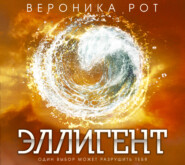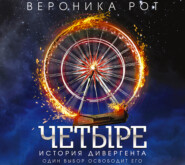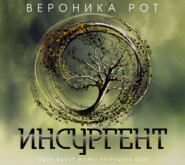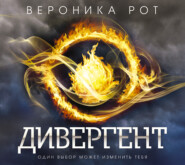По всем вопросам обращайтесь на: info@litportal.ru
(©) 2003-2024.
✖
Carve the Mark
Настройки чтения
Размер шрифта
Высота строк
Поля
Eijeh quirked his eyebrows. He never got embarrassed about anything, never flushed. Not even when the kids at school teased him for his voice—higher than most boys’—or for being rich, not something that made a person popular here in Hessa. He didn’t snap back, either. Just had a gift for shutting things out and letting them back in only when he wanted to.
He grabbed Akos by the elbow and pulled him after Ori. Cisi stayed behind, with their parents, like always. Eijeh and Akos chased Ori’s heels all the way into the Hall of Prophecy.
Ori gasped, and when Akos saw inside the hall, he almost echoed her. Somebody had strung hundreds of lanterns—each one dusted with hushflower to make it red—from the apex of the dome down to the outermost walls, in every direction, so a canopy of light hung over them. Even Eijeh’s teeth glowed red, when he grinned at Akos. In the middle of the room, which was usually empty, was a sheet of ice about as wide as a man was tall. Growing inside it were dozens of closed-up hushflowers on the verge of blooming.
More burnstone lanterns, about as big as Akos’s thumb, lined the sheet of ice where the hushflowers waited to bloom. These glowed white, probably so everyone could see the hushflowers’ true color, a richer red than any lantern. As rich as blood, some said.
There were a lot of people milling about, dressed in their finery: loose gowns that covered all but the hands and head, fastened with elaborate glass buttons in all different colors; knee-length waistcoats lined with supple elte skin, and twice-wrapped scarves. All in dark, rich colors, anything but gray or white, in contrast to their coats. Akos’s jacket was dark green, one of Eijeh’s old ones, still too big in the shoulders for him, and Eijeh’s was brown.
Ori led the way straight to the food. Her sour-faced aunt was there, offering plates to passersby, but she didn’t look at Ori. Akos got the feeling Ori didn’t like her aunt and uncle, which was why she pretty much lived at the Kereseth house, but he didn’t know what had happened to her parents.
Eijeh stuffed a roll in his mouth, practically choking on the crumbs.
“Careful,” Akos said to him. “Death by bread isn’t a dignified way to go.”
“At least I’ll die doing what I love,” Eijeh said, around all the bread.
Akos laughed.
Ori hooked her elbow around Eijeh’s neck, tugging his head in close. “Don’t look now. Stares coming in from the left.”
“So?” Eijeh said, spraying crumbs. But Akos already felt heat creeping into his neck. He chanced a look over at Eijeh’s left. A little group of adults stood there, quiet, eyes following them.
“You’d think you’d be a little more used to it, Akos,” Eijeh said to him. “Happens all the time, after all.”
“You’d think they would be used to us,” Akos said. “We’ve lived here all our lives, and we’ve had fates all our lives, what’s there to stare at?”
Everyone had a future, but not everyone had a fate—at least, that was what their mom liked to say. Only parts of certain “favored” families got fates, witnessed at the moment of their births by every oracle on every planet. In unison. When those visions came, their mom said, they could wake her from a sound sleep, they were so forceful.
Eijeh, Cisi, and Akos had fates. Only they didn’t know what they were, even though their mom was one of the people who had Seen them. She always said she didn’t need to tell them; the world would do it for her.
The fates were supposed to determine the movements of the worlds. If Akos thought about that too long, he got nauseous.
Ori shrugged. “My aunt says the Assembly’s been critical of the oracles on the news feed lately, so it’s probably just on everyone’s minds.”
“Critical?” Akos said. “Why?”
Eijeh ignored them both. “Come on, let’s find a good spot.”
Ori brightened. “Yeah, let’s. I don’t want to get stuck staring at other people’s butts like last year.”
“I think you’ve grown past butt height this year,” Eijeh said. “Now you’re at mid-back, maybe.”
“Oh good, because I definitely put on this dress for my aunt so I could stare at a bunch of backs.” Ori rolled her eyes.
This time Akos slipped into the crowd in the Hall of Prophecy first, ducking under glasses of wine and swooping gestures until he got to the front, right by the ice sheet and the closed-up hushflowers. They were right on time, too—their mom was up by the ice sheet, and she had taken off her shoes, though it was chilly in here. She said she was better at being an oracle when she was closer to the ground.
A few ticks ago he’d been laughing with Eijeh, but as the crowd went quiet, everything in Akos went quiet, too.
Eijeh leaned in close to him and whispered in his ear, “Do you feel that? The current’s humming like crazy in here. It’s like my chest is vibrating.”
Akos hadn’t noticed it, but Eijeh was right—he did feel like his chest was vibrating, like his blood was singing. Before he could answer, though, their mom started talking. Not loud, but she didn’t have to be, because they all knew the words by heart.
“The current flows through every planet in the galaxy, giving us its light as a reminder of its power.” As if on cue, they all looked up at the currentstream, its light showing in the sky through the red glass of the dome. At this time of year, it was almost always dark red, just like the hushflowers, like the glass itself. The currentstream was the visible sign of the current that flowed through all of them, and every living thing. It wound across the galaxy, binding all the planets together like beads on a single string.
“The current flows through everything that has life,” Sifa went on, “creating a space for it to thrive. The current flows through every person who breathes breath, and emerges differently through each mind’s sieve. The current flows through every flower that blooms in the ice.”
They scrunched together—not just Akos and Eijeh and Ori, but everyone in the whole room, standing shoulder to shoulder, so they could all see what was happening to the hushflowers in the ice sheet.
“The current flows through every flower that blooms in the ice,” Sifa repeated, “giving them the strength to bloom in the deepest dark. The current gives the most strength to the hushflower, our marker of time, our death-giving and peace-giving blossom.”
For a while there was silence, and it didn’t feel odd, like it should have. It was as if they were all hum-buzz-singing together, feeling the strange force that powered their universe, just like friction between particles powered the burnstones.
And then—movement. A shifting petal. A creaking stem. A shudder went through the small field of hushflowers growing among them. No one made a sound.
Akos glanced up at the red glass, the canopy of lanterns, just once, and he almost missed it—all the flowers bursting open. Red petals unfurling all at once, showing their bright centers, draping over their stems. The ice sheet teemed with color.
Everyone gasped, and applauded. Akos clapped with the rest of them, until his palms itched. Their dad came up to take their mom’s hands and plant a kiss on her. To everyone else she was untouchable: Sifa Kereseth, the oracle, the one whose currentgift gave her visions of the future. But their dad was always touching her, pressing the tip of his finger into her dimple when she smiled, tucking strays back into the knot she wore her hair in, leaving yellow flour fingerprints on her shoulders when he was done kneading the bread.
Their dad couldn’t see the future, but he could mend things with his fingers, like broken plates or the crack in the wall screen or the frayed hem of an old shirt. Sometimes he made you feel like he could put people back together, too, if they got themselves into trouble. So when he walked over to Akos, swung him into his arms, Akos didn’t even get embarrassed.
“Smallest Child!” his dad cried, tossing Akos over his shoulder. “Ooh—not so small, actually. Almost can’t do this anymore.”
“That’s not because I’m big, it’s because you’re old,” Akos replied.
“Such words! From my own son,” his dad said. “What punishment does a sharp tongue like that deserve, I wonder?”
“Don’t—”
But it was too late; his dad had already pitched him back and let him slide so he was holding both of Akos’s ankles. Hanging upside down, Akos pressed his shirt and jacket to his body, but he couldn’t help laughing. Aoseh lowered him down, only letting go when Akos was safe on the ground.
“Let that be a lesson to you about sass,” his dad said, leaning over him.
“Sass causes all the blood to rush to your head?” Akos said, blinking innocently up at him.
“Precisely.” Aoseh grinned. “Happy Blooming.”
Akos returned the grin. “You too.”
That night they all stayed up so late Eijeh and Ori both fell asleep upright at the kitchen table. Their mom carried Ori to the living room couch, where she spent a good half of her nights these days, and their dad roused Eijeh. Everybody went one way or another after that, except Akos and his mom. They were always the last two up.
His mom switched the screen on, so the Assembly news feed played at a murmur. There were nine nation-planets in the Assembly, all the biggest or most important ones. Technically each nation-planet was independent, but the Assembly regulated trade, weapons, treaties, and travel, and enforced the laws in unregulated space. The Assembly feed went through one nation-planet after another: water shortage on Tepes, new medical innovation on Othyr, pirates boarded a ship in Pitha’s orbit.
His mom was popping open cans of dried herbs. At first Akos thought she was going to make a calming tonic, to help them both rest, but then she went into the hall closet to get the jar of hushflower, stored on the top shelf, out of the way.
“I thought we’d make tonight’s lesson a special one,” Sifa said. He thought of her that way—by her given name, and not as “Mom”—when she taught him about iceflowers. She’d taken to calling these late-night brewing sessions “lessons” as a joke two seasons ago, but now she sounded serious to Akos. Hard to say, with a mom like his.
“Get out a cutting board and cut some harva root for me,” she said, and she pulled on a pair of gloves. “We’ve used hushflower before, right?”
















